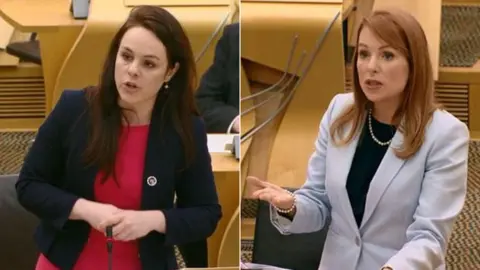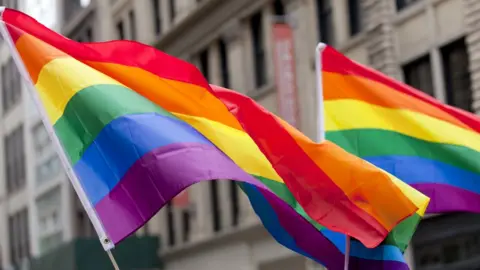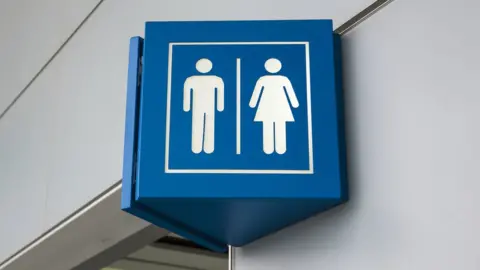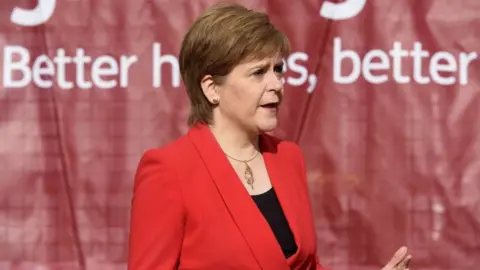SNP politicians raise transgender law concerns
 BBC
BBCFifteen senior SNP politicians have urged the Scottish government not to "rush" into "changing the definition of male and female".
The government wants to make it easier for trans people to change their legally recognised gender.
But in their letter, the politicians raise concerns about the potential implications for women of allowing people to self-identify their sex.
It has been signed by three government ministers, and several MSPs and MPs.
The letter comes a week after it emerged three female SNP MSPs had accused First Minister Nicola Sturgeon of being "out of step" with her colleagues over transgender rights in a private online conversation that was subsequently leaked.
They were responding to a speech in which Ms Sturgeon said transgender rights are not "a threat to me as a woman".
Concerns have been raised by some that allowing people to self-identify their gender could damage the legal protections given to women under the Equality Act - including the right to single-sex spaces such as changing rooms, and women-only shortlists.
What is the Scottish government proposing?
 Getty Images
Getty ImagesTransgender people who want to change their legally recognised gender are able to apply under the Gender Recognition Act (GRA).
But in order to do so, they must satisfy a panel that they have, or have had, gender dysphoria - distress as a result of the sex and gender they were assigned at birth - and produce two medical reports detailing this diagnosis.
They must also have lived in their acquired gender for at least two years, and make a formal declaration that they intend to continue to do so for the rest of their life.
The Scottish government believes this process is intrusive and outdated, and wants to move to a "self-declaration" model.
This would mean applicants no longer need to have been diagnosed with gender dysphoria, or prove that they have been living as their acquired gender for two years.
Similar laws are already in place in countries including Ireland, Denmark, Norway and Argentina.
The government also wants to lower the age that a person can apply to change their legally-recognised gender from 18 to 16.
Its consultation on the proposals closed in March of last year - but it has still not responded to the comments it received.
What do the SNP politicians say in their letter?
 Getty Images
Getty ImagesThe letter, which has been published in the Scotsman newspaper, says that many people are "only now developing an understanding of the implications of the self-identification of sex, particularly on women".
It adds: "Conflating sex with gender identification affects a wide range of policy and service delivery, including data collection, education, health and social care, justice and sport. New information about this topic is emerging all the time and deserves to be properly scrutinised.
"Changing the definition of male and female is a matter of profound significance. It is not something we should rush."
The letter also stresses that all of those who signed it are "committed to human rights, equality and dignity for all people" and calls for an end to "knee-jerk accusations of transphobia" against anyone who raises concerns about the proposals.
It has been signed by government ministers Kate Forbes, Ash Denham and Ivan McKee, as well as SNP MSPs Joan McAlpine, Ruth Maguire, Christine Grahame and Kenneth Gibson, and MPs Carol Monaghan, Angus Macneil, Patricia Gibson and Joanna Cherry.
Four senior SNP councillors - Chris McEleny, Caroline McAllister, Shaun Macaulay and Lynne Anderson - have also added their signatures.
What has Ms Sturgeon said about the issue?
 Getty Images
Getty ImagesIn a speech to the United Nations in New York in February, Ms Sturgeon said that "some of the concerns that are expressed on the part of women and feminists are misplaced".
She added: "As an ardent, passionate feminist, and have been all of my life, I don't see the greater recognition of transgender rights as a threat to me as a woman or to my feminism.
"But I think there is a need to bring different parts of this debate together and to try to find the way forward that will respect the rights of transgender people and recognizes and hopefully addresses some of the concerns that are expressed."
An image was leaked on Twitter last week which showed SNP MSP Ruth Maguire responding to Ms Sturgeon's speech by posting "FFS" in a private online conversation with colleagues Ash Denham and Gillian Martin.
Ms Denham and Ms Martin then appeared to suggest that Ms Sturgeon, the SNP leader, is "out of step" with her party over the issue.
Responding to the leak, the SNP said it "supports trans rights and women's rights as part of our commitment to human rights and equality".
The Scottish government says trans men and women are among the most stigmatised groups in society, and it remains committed to changing that.
It also insists it does not want to change the definition of male and female, and has pledged to listen to and address the concerns that have been raised.
What about trans groups?
Responding to the letter, the Equality Network tweeted that: "Trans people don't want to change the definitions of male and female; they simply want to be recognised, and treated with dignity, as the sex they are."
Colin Macfarlane, the director of Stonewall Scotland, claimed that none of the SNP MSPs who signed the letter had attended an event in the Scottish Parliament on Tuesday evening where trans people described the barriers and discrimination that they face.
He added: "A recurring theme from that event was the anxiety and fear trans folk are experiencing due to the delay in the Scottish government responding to the GRA consultation. It has been over a year since the consultation closed."
Mr Macfarlane also highlighted the support that the proposed changes have received from women's groups including Scottish Women's Aid, Rape Crisis Scotland and Women 50:50.
